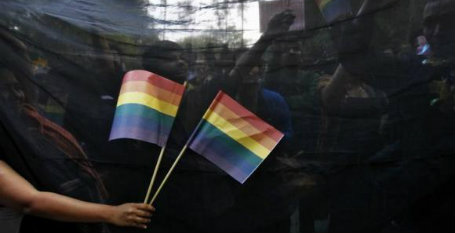LGBT activists say the plight of sexual minorities has worsened with more instances of discrimination since the past one year when the Supreme Court recriminalized same-sex relations.
About 500 LGBT activists under the umbrella of the HIV/AIDS Alliance organized Dec 11 a public hearing to discuss the consequences of the ruling and review cases of discrimination that has taken place since the Supreme Court’s verdict exactly a year ago.
The ruling has increased vulnerability of gender and sexual minorities to violence, stigma and discrimination, media quoted the activists as saying.
James Robertson, executive director of Alliance India pointed out that sexual minorities are often denied opportunities and that any families reject them and push them further to society’s margins, increasing their vulnerability to a range of harms including HIV.
During the hearing, members of the LGBT community spoke about the brutality they have faced. “The December 11th verdict has made our already vulnerable community even more vulnerable to violence at the hands of police. I was threatened and assaulted so badly that I have lost the ability to hear from the right ear,” said one activist.
Another incident detailed the arrest of 13 gay men in the southern Indian Karnataka state on the grounds of violating “Section 377,” the colonial-era law that describes same-sex relations as “unnatural” and punishable with life imprisonment.
“Our identity was made public and as a consequence we were socially ostracized, ridiculed by family, bullied by neighbors and even lost our jobs,” recounted one of the accused.
Same-sex relations has been a contentious issue in socially conservative India where hugging, kissing and any form of public display of affection by even straight couples is strongly frowned upon. Gay people face stigma and same-sex relations are seen as a social taboo.
Gay rights activists have always maintained that the Section 377 law besides being discriminatory and unjust left the LGBT community open to harassment, persecution and prone to be preyed upon by police and criminals.
Indian gay rights activists have for years been waging a legal battle to do away with Section 377. Efforts have resulted in a flip-flop with courts decriminalizing and then recriminalizing that law. The Supreme Court Dec 11 last year upheld the validity of Section 377, reversing the 2009 Delhi’s high court ruling that decriminalized it and gave the gay community broad protections and rights.
The hearing in the Indian capital of New Delhi also saw some speakers in favor of the LGBT community. National Human Rights Commission of India chairman K. G. Balakrishnan pointed out that the LGBT community should not be categorized as criminals and Swami Agnivesh, a popular social activist, said, it was surprising that independent India has not been able to overcome the colonial-era law.
LGBT activists say the plight of sexual minorities has worsened with more instances of discrimination since the past one year when the Supreme Court recriminalized same-sex relations.
About 500 LGBT activists under the umbrella of the HIV/AIDS Alliance organized Dec 11 a public hearing to discuss the consequences of the ruling and review cases of discrimination that has taken place since the Supreme Court’s verdict exactly a year ago.
The ruling has increased vulnerability of gender and sexual minorities to violence, stigma and discrimination, media quoted the activists as saying.
James Robertson, executive director of Alliance India pointed out that sexual minorities are often denied opportunities and that any families reject them and push them further to society’s margins, increasing their vulnerability to a range of harms including HIV.
During the hearing, members of the LGBT community spoke about the brutality they have faced. “The December 11th verdict has made our already vulnerable community even more vulnerable to violence at the hands of police. I was threatened and assaulted so badly that I have lost the ability to hear from the right ear,” said one activist.
Another incident detailed the arrest of 13 gay men in the southern Indian Karnataka state on the grounds of violating “Section 377,” the colonial-era law that describes same-sex relations as “unnatural” and punishable with life imprisonment.
“Our identity was made public and as a consequence we were socially ostracized, ridiculed by family, bullied by neighbors and even lost our jobs,” recounted one of the accused.
Same-sex relations has been a contentious issue in socially conservative India where hugging, kissing and any form of public display of affection by even straight couples is strongly frowned upon. Gay people face stigma and same-sex relations are seen as a social taboo.
Gay rights activists have always maintained that the Section 377 law besides being discriminatory and unjust left the LGBT community open to harassment, persecution and prone to be preyed upon by police and criminals.
Indian gay rights activists have for years been waging a legal battle to do away with Section 377. Efforts have resulted in a flip-flop with courts decriminalizing and then recriminalizing that law. The Supreme Court Dec 11 last year upheld the validity of Section 377, reversing the 2009 Delhi’s high court ruling that decriminalized it and gave the gay community broad protections and rights.
The hearing in the Indian capital of New Delhi also saw some speakers in favor of the LGBT community. National Human Rights Commission of India chairman K. G. Balakrishnan pointed out that the LGBT community should not be categorized as criminals and Swami Agnivesh, a popular social activist, said, it was surprising that independent India has not been able to overcome the colonial-era law.

